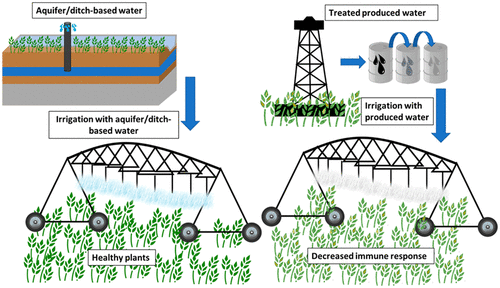当前位置:
X-MOL 学术
›
Environ. Sci. Technol. Lett.
›
论文详情
Our official English website, www.x-mol.net, welcomes your feedback! (Note: you will need to create a separate account there.)
Food Crop Irrigation with Oilfield-Produced Water Suppresses Plant Immune Response
Environmental Science & Technology Letters ( IF 10.9 ) Pub Date : 2019-10-14 , DOI: 10.1021/acs.estlett.9b00539 Hannah Miller 1 , Pankaj Trivedi 2 , Yuheng Qiu 1 , Erin M. Sedlacko 3 , Christopher P. Higgins 3 , Thomas Borch 1, 4
Environmental Science & Technology Letters ( IF 10.9 ) Pub Date : 2019-10-14 , DOI: 10.1021/acs.estlett.9b00539 Hannah Miller 1 , Pankaj Trivedi 2 , Yuheng Qiu 1 , Erin M. Sedlacko 3 , Christopher P. Higgins 3 , Thomas Borch 1, 4
Affiliation

|
Oil and gas extraction in the western United States generates significant volumes of produced water (PW) that is typically injected into deep disposal wells. Recently, crop irrigation has emerged as an attractive PW reuse option, but the impact on plant immune response is not known. In this study, we conducted a 3-month greenhouse pot study. Spring wheat (Triticum aestivum) was irrigated 3 times a week with 150 mL (∼80–100% of soil water holding capacity) with one of four irrigation treatments: tap water control, 10% PW dilution, 50% PW dilution, and salt water (NaCl50) control containing the same amount of total dissolved solids as PW50 to determine the effect on disease resistance. The wheat leaves were inoculated with either bacterial or fungal pathogens and changes in pathogenesis-related PR-1 and PR-5 gene expression were measured from the leaf tissue. PW50 experienced the largest relative suppression of PR-1 and PR-5 gene expression compared to noninfected wheat, followed by PW10, NaCl50, and the tap water control. A combination of PW contaminants (boron, total petroleum hydrocarbons, and NaCl) are likely reducing PR-gene expression by reallocating metabolic resources to fight abiotic stresses, which then makes it more challenging for the plants to produce PR genes to fight pathogens. This study provides the first evidence that plant disease resistance is reduced due to irrigation with reused PW, which could have negative implications for food security.
中文翻译:

用油田生产的水进行粮食作物灌溉会抑制植物的免疫反应
美国西部的石油和天然气开采会产生大量的产出水(PW),通常将其注入深层处置井。最近,农作物灌溉已成为一种有吸引力的PW再利用选择,但对植物免疫反应的影响尚不清楚。在这项研究中,我们进行了为期3个月的温室盆栽研究。春小麦(小麦)每周以150毫升(约80-100%的土壤持水量)的3种灌溉方式进行3次灌溉:自来水控制,10%PW稀释,50%PW稀释和盐水(NaCl50)控制含有与PW50相同量的总溶解固体,以确定对疾病抵抗力的影响。用细菌或真菌病原体接种小麦叶片,并从叶片组织中测量与发病相关的PR-1和PR-5基因表达的变化。与未感染的小麦相比,PW50经历的PR-1和PR-5基因表达的相对抑制最大,其次是PW10,NaCl50和自来水控制。PW污染物(硼,总石油烃和NaCl)的组合很可能会通过重新分配代谢资源来应对非生物胁迫而降低PR基因的表达,这样一来,植物产生PR基因对抗病原体的挑战就更大了。这项研究提供了第一个证据,表明通过重复利用PW灌溉降低了植物的抗病性,这可能对粮食安全产生负面影响。
更新日期:2019-10-14
中文翻译:

用油田生产的水进行粮食作物灌溉会抑制植物的免疫反应
美国西部的石油和天然气开采会产生大量的产出水(PW),通常将其注入深层处置井。最近,农作物灌溉已成为一种有吸引力的PW再利用选择,但对植物免疫反应的影响尚不清楚。在这项研究中,我们进行了为期3个月的温室盆栽研究。春小麦(小麦)每周以150毫升(约80-100%的土壤持水量)的3种灌溉方式进行3次灌溉:自来水控制,10%PW稀释,50%PW稀释和盐水(NaCl50)控制含有与PW50相同量的总溶解固体,以确定对疾病抵抗力的影响。用细菌或真菌病原体接种小麦叶片,并从叶片组织中测量与发病相关的PR-1和PR-5基因表达的变化。与未感染的小麦相比,PW50经历的PR-1和PR-5基因表达的相对抑制最大,其次是PW10,NaCl50和自来水控制。PW污染物(硼,总石油烃和NaCl)的组合很可能会通过重新分配代谢资源来应对非生物胁迫而降低PR基因的表达,这样一来,植物产生PR基因对抗病原体的挑战就更大了。这项研究提供了第一个证据,表明通过重复利用PW灌溉降低了植物的抗病性,这可能对粮食安全产生负面影响。



























 京公网安备 11010802027423号
京公网安备 11010802027423号